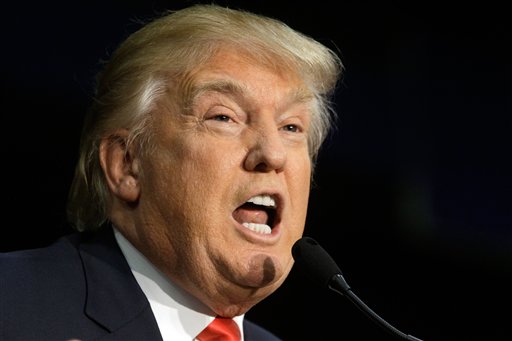FORT DODGE, Iowa (AP) — Republican presidential candidate Donald Trump said in an interview Thursday that rival Ben Carson has a “pathological temper” that can’t be cured any more than a child molester can be cured.
In Iowa he continued the strong criticism, telling people at a rally that he didn’t believe Carson’s story of his religious awakening and questioned his tale of nearly stabbing a friend.
“How stupid are the people of Iowa?” Trump bellowed during a rally at Iowa Central Community College. “How stupid are the people of this country to believe this crap?”
In an interview with CNN, the businessman pointed to Carson’s own descriptions of his “pathological temper” as a young man.
“That’s a big problem because you don’t cure that,” Trump said. “That’s like, you know, I could say, they say you don’t cure — as an example, child molester. You don’t cure these people. You don’t cure the child molester.” Trump also said that “pathological is a very serious disease.”
CNN’s Erin Burnett asked Trump if he was satisfied by Carson’s assurances that his anger was in the past, and Trump said he didn’t know. “You’ll have to ask him that question,” he said according to a CNN report on the interview. “Look, I hope he’s fine because I think it would be a shame.”
Asked for comment on Trump’s remarks about Carson’s temper, a spokesman for Carson’s campaign said it had no comment.
In his book “Gifted Hands,” Carson described the uncontrollable anger he felt at times while growing up in inner-city Detroit. He wrote that on one occasion he nearly punched his mother and on another he attempted to stab a friend with a knife.
“I had what I only can label a pathological temper — a disease — and this sickness controlled me, making me totally irrational,” Carson said in describing the incident with his mother. He referred to “pathological anger” again in telling about lunging at his friend, the knife blade breaking off when it hit the boy’s belt buckle.
Carson’s ability to overcome his anger as well as an impoverished childhood to become a world-renowned neurosurgeon has been a central chapter in his personal story.
During the rally Thursday night in Fort Dodge, Trump told the crowd that “Carson’s an enigma to me” and questioned story after story in Carson’s biography. He acted out the scene of Carson trying to stab his friend, lurching forward and shouting, “but, low and behold, it hit the belt!”
Carson describes in “Gifted Hands” racing to the bathroom in his house after the near-stabbing incident and in time began to pray for God’s help in dealing with his temper. “During those hours alone in the bathroom, something happened to me,” he wrote. “God heard my deep cries of anguish. A feeling of lightness flowed over me, and I knew a change of heart had taken place. I felt different. I was different.”
In questioning Carson’s religious awakening, Trump said in Fort Dodge that Carson went into the bathroom and came out and “now he’s religious.”
“And the people of Iowa believe him. Give me a break. Give me a break. It doesn’t happen that way,” he said. “Don’t be fools.”
Copyright 2015 The Associated Press. All rights reserved. This material may not be published, broadcast, rewritten or redistributed.









.jpg)